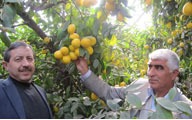
Working to Develop the Agricultural Sector to Benefit Smallholder Farmers
ACDI/VOCA implemented the USAID-funded Productive Agriculture Project in Tajikistan. The project helped farmers transition to commercial production and participate in profitable value chains. Taking a value chain approach, the project leveraged private sector incentives and relationships between input dealers, processors, and trade associations to strengthen market linkages and improve the delivery of vital services at the farm level, including technical assistance and finance. Farmers then made investments in technologies that allowed them to increase productivity and improve quality of production to reach markets that offer higher prices.
Facilitating Investments at the Farm Level
The project addressed supply and demand constraints within the agricultural inputs industry to bolster growth and competitiveness. The Productive Agriculture Project linked input dealers and lead farms to launch demonstration plots at the demand-level, conveying the potential yields and returns resulting from best agricultural practices. To help overcome the risk involved in adopting new technologies, vouchers covered the difference in cost between the new technology and current practices.
The project strengthened the distribution network of agro-input businesses by supporting linkages between retailers, wholesalers, importers, and international input dealers through trade fairs and study tours. It also supported the agro-input sector in marketing “technology packages” of high-quality, certified inputs with embedded technical assistance. Thanks to the project’s effort, the participating input dealer network in Khatlon grew from six to 13 dealers in 2013.
The project facilitated access to finance to allow farmers and other value chain participants to invest in the required upgrades. It also provided technical assistance with loan product development to financial institutions and input dealers. Through its Mechanization Finance Program, the project provided incentive grants to Khatlon’s smallholder farmers in targeted value chains. These grants went toward investments in tractors, farm equipment, and other tools. Additionally, the project helped farmers who did not have sufficient capital to receive loans from financial institutions through an innovative loan product, which did not require collateral beyond the tractors themselves.
Value Chain Linkages Yield Success
The project improved value chain linkages to help farms investing in commercial production to secure access to premium domestic and international markets.
The project helped the lead firms engage in the dried apricot sector to establish Tajikistan Foods Association—the first industry export association of its kind—which became a major driver of value chain competitiveness. In its final year, the project worked with this and other associations on implementing quality controls, improving the Tajikistan brand, and solidifying linkages with export markets.
The project brought wholesalers and exporters to the farm gate to buy the farmers’ produce during seasonal windows when there were premium prices. This helped create long-term commercial relationships and allowed Tajikistan farmers to expand their produce sales to export markets.





